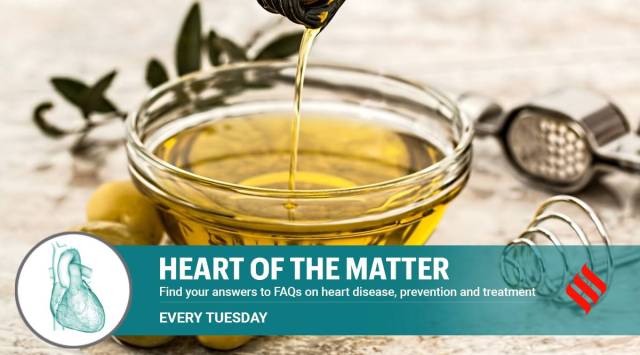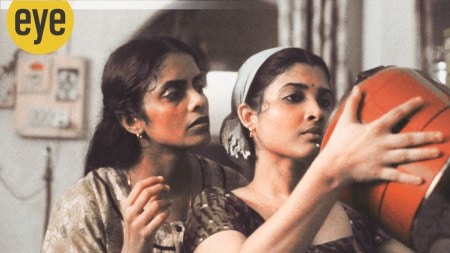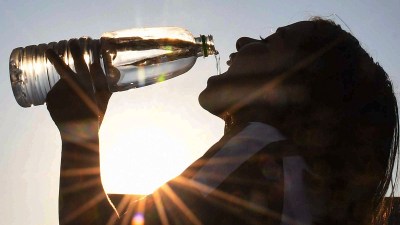- India
- International
How do you use heart-healthy oils, if you’re watching your bad cholesterol? Why do you need to change it intermittently?
We must understand that 75 to 80 percent of our heart risk is genetic and 25 per cent is because of our food and exercise. While statins do their job of lowering cholesterol drastically, you have to support their efficiency with the right kind of diet, says Dr T S Kler, Chairman, Fortis Heart and Vascular Institute, Fortis Memorial Research Institute, Gurugram.
 Over consumption of any kind of oil, be it saturated or unsaturated, also increases the production of particles that we call cholesterol-rich remnants. (Pic source: Pixabay)
Over consumption of any kind of oil, be it saturated or unsaturated, also increases the production of particles that we call cholesterol-rich remnants. (Pic source: Pixabay) Given that Indians are more prone to heart disease, there is a need to reconsider our dietary practices and move away from fried and oily food and change our cooking methods to mostly roasting, baking or even steaming. The fact is we do not like the taste of pure protein unless it comes wrapped in fat, which ups the flavour profile. But if we are to ever govern our cardiac risk, then we have to modify our cooking practices.
No oil can be good for the heart as a cooking medium because overheating or smoking it, as we tend to do for our dishes, takes away any virtue it might have had. Oil is nothing but fat and it is very important to go for only the monounsaturated or polyunsaturated variety. The saturated and trans fats may raise unhealthy low density lipoprotein (LDL) cholesterol and lower healthy high density lipoprotein (HDL) cholesterol. This in turn increases your risk of high blood pressure, hardening of the arteries (atherosclerosis), heart attack and stroke.
HOW DIET CAN HELP IN LDL MANAGEMENT
In the end, we have to watch our LDL levels and use all means possible to lower them. For Indians, it is preferable to keep LDL levels lesser than 50 mg/dL. We must understand that 75 to 80 per cent of our heart risk is genetic, and 25 per cent is because of our food and exercise. Yes, stains do their job of lowering cholesterol drastically but you have to support its benefit with the right kind of diet. Having a heart healthy diet and lowering body weight can lower your LDL by up to 10 per cent.
HOW TO USE OILS
Of course, our body needs some fat for the functioning of our nervous system and transporting some fat-soluble nutrients, particularly vitamins, to all parts of the body but we need limited quantities for that. Many of my patients ask me how much and what kind of oil they should use in their cooking. First, the cooking technique that I mentioned above has to change, avoid frying as much as possible. Second, follow a basic, fundamental formula for usage: Roughly 70 per cent of cooking should be done with unsaturated oils like groundnut oil, corn oil, sunflower oil and olive oil. Only 15 to 20 per cent of your cooking should be done in mustard oil while 10 per cent should be done in ghee because it is saturated fat. It can be used as tempering because it does contain some good fats that are needed for the body. Include a good portion of salads in your diet over which you can dribble olive oil.
HOW TO CHANGE OILS INTERMITTENTLY
Even when you are choosing unsaturated oils, keep on rotating their variety. So, if you are having sunflower oil as a cooking medium for a while, disrupt that pattern and switch over to corn oil for a while. Then break that pattern and interchange with olive oil for instance. The idea is not to let your body get accustomed to any one type and make it want more and ensure the best balanced intake of all the mono and polyunsaturated fatty acids present in each variety.
HOW DOES DEEP FRYING IMPACT THE HEART

Deep frying changes the character of fatty acids. And with chemical changes, their advantage goes. When oils are reused over and over for frying, they break down and can result in the food absorbing even more oil than intended. Over time, this becomes risky for heart health.
Many studies have been done on the impact of oily and fatty food on the heart. One such research showed how red blood cells, which ought to be round and smooth, developed changes after study subjects had high fat meals. These are damaging to the blood vessels and create conditions for onset of heart disease. Too much oil also increases an enzyme that could affect the elasticity of blood vessels. These damaged parts of your blood vessels become sites for plaque deposition, narrowing the artery and making it harder to pump blood.
Over consumption of any kind of oil, be it saturated or unsaturated, also increases the production of particles that we call cholesterol-rich remnants. One of these remnants is VLDL, which is produced by the liver. You would have seen that the doctor looks for the VLDL in your lipid profile. Another type are chylomicrons, which are produced by the small intestine. These act just like LDL, damaging your artery wall.
May 26: Latest News
- 01
- 02
- 03
- 04
- 05




































